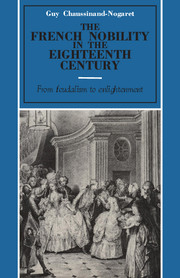Book contents
- Frontmatter
- Contents
- Introduction: the gilded ghetto of royal nobility
- 1 The Enlightenment and noble ideology
- 2 The nobility between myth and history
- 3 Plutocrats and paupers
- 4 The fundamental divide: culture
- 5 The nobility and capitalism
- 6 Rites and strategies: the marriage market
- 7 The nobility against the Old Regime
- 8 A plan for society
- Conclusion
- Afterword to the English edition
- Notes
- Bibliography
- Supplementary bibliography
- Index
3 - Plutocrats and paupers
Published online by Cambridge University Press: 05 June 2012
- Frontmatter
- Contents
- Introduction: the gilded ghetto of royal nobility
- 1 The Enlightenment and noble ideology
- 2 The nobility between myth and history
- 3 Plutocrats and paupers
- 4 The fundamental divide: culture
- 5 The nobility and capitalism
- 6 Rites and strategies: the marriage market
- 7 The nobility against the Old Regime
- 8 A plan for society
- Conclusion
- Afterword to the English edition
- Notes
- Bibliography
- Supplementary bibliography
- Index
Summary
The old regime is commonly defined as one in which a hierarchy of orders existed together. So there is a strong temptation to think of the nobility as a homogeneous, structured and unified whole. However, a mere glance at the lack of cultural homogeneity and the bitterness of the antagonisms that seethed within the order leads one to wonder whether, as in the case of the third estate, the term order does not take in – even juridically – circumstances so different as to be irreducible to a single definition. The rights of a lord high justiciar, or those of a great officer of the Crown, should in no case be ranked with the slender and often theoretical privileges of a petty squire. Nor did either side mistake matters: there was no equality between them, and perhaps no sympathy or solidarity either.
It is true that in France there was no popular nobility, and the definition was the same for all. There was nothing like the nobility enjoyed in Poland by every man who had remained free when serfdom was generalised, or like the nobility of the Basque country which was based on the absence of Muslim forebears. However, a petty nobility did exist and they were aware of their individuality and apartness: it would be ludicrous to confuse them with the high nobility which never mingled its blood with theirs. This in fact was a decisive characteristic; different levels of nobility did not mix.
- Type
- Chapter
- Information
- The French Nobility in the Eighteenth CenturyFrom Feudalism to Enlightenment, pp. 43 - 64Publisher: Cambridge University PressPrint publication year: 1985



